CLOSE
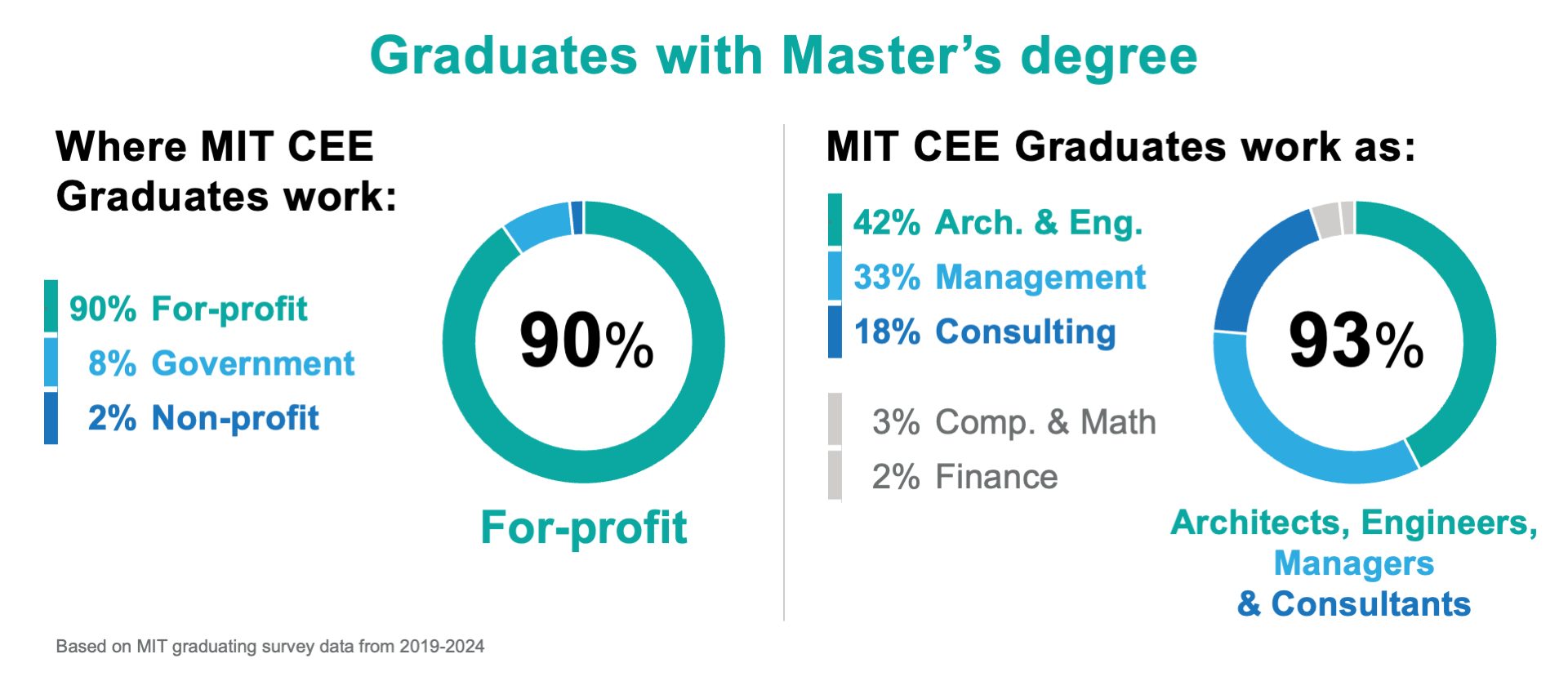
Our graduate programs provide limitless career possibilities. Graduates with a master's in engineering degree launch careers in industry, while graduates from our SM and PhD degree tracks go on to top jobs as engineers, faculty members, at eminent universities, engineering consultants, leaders for NGOs, and entrepreneurs.
Learn more about our alumni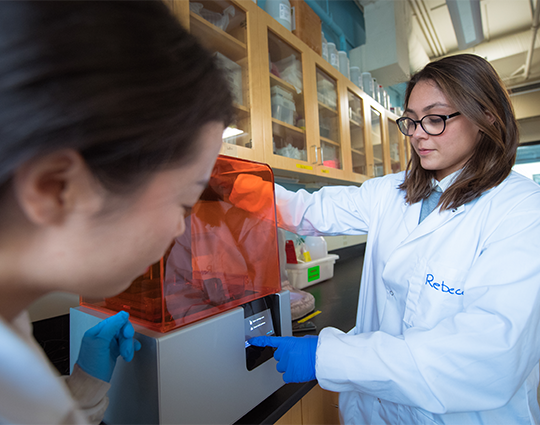
Our graduate programs provide limitless possibilities at the frontier of knowledge and innovation. Graduate students in the Department of Civil and Environmental Engineering make a lasting impact in the world, as they launch careers in academia and industry, or become entrepreneurs.
We want our students to work together whenever possible, and not just with each other. At MIT CEE, our graduate students work closely with all members of our department – faculty, undergraduate students, other graduate students, postdocs and staff. Learning does not stop once you leave the classroom or laboratory. Through interdisciplinary research and social gatherings, the education process is constant.
We offer advanced master and doctorate degrees within the areas of environmental chemistry; environmental fluid mechanics; ecology and evolution; hydrology and hydroclimatology; networks, systems engineering including networks and transportation, and materials, structures and geomechanics.
The Master of Engineering (MEng) degree program is our professional-oriented graduate program. The MEng program consists of high level, fast paced coursework and significant engagement with real world engineering projects, preparing our graduates for a professional career path, or further graduate studies at MIT or elsewhere. This 9 month program, with individualized tracks – prepares our graduates for addressing significant challenges in the domains of Civil and Environmental Engineering.
For current MIT students, the program is a natural extension of the Institute’s 4 year Bachelor of Science degree for students to gain practical experiences and prepare for emerging fields in today’s job market. The MEng program is self-funded. Admitted students are responsible for paying tuition and cost-of-living expenses or securing external fellowships. MIT’s Office of Graduate Education maintains a helpful database of such fellowships on their website.

The Climate, Environment, and Sustainability (CES) track of the MEng degree program deepens students' understanding of CES while providing opportunities to conduct research across the full spectrum of civil and environmental engineering topics.
Learn more
The Data Science for Engineering Systems (DSES) track of the MEng degree program equips students with advanced expertise in data science and computational modeling tools to enhance the sustainability and resilience of next-generation, societal-scale infrastructure systems.
Learn More
The Structural Mechanics and Design (SMD) track of the MEng degree program allows students to pursue research in structural engineering mechanics, computational design and optimization, and collaborative workflows at the intersection of engineering and architecture.
Learn MoreThe Master of Science (SM) and Doctor of Philosophy (PhD) are the research focused graduate degrees in the department of Civil and Environmental Engineering (CEE). Each SM and PhD graduate student in our department is matched with one of our faculty members to work together on the research component of the graduate degree.
Connecting graduate students through research interests with faculty and offering the opportunity for advanced course work is a combination that produces highly successful graduates that emerge as leaders in their fields.
With broad areas of study, we offer students the opportunity to pursue educational goals – through research and course work that is exciting and motivating to you.
The interdepartmental Master of Science in Transportation (MST) degree program emphasizes the complexity of transportation and its dependence on the interaction of technology, operations, planning, management and policy-making. For this reason, the Master of Science in Transportation program is interdepartmental. Faculty members and research staff from several centers, departments and divisions within MIT are affiliated with the program and serve as research advisors and mentors to MST students.
The interdepartmental Doctoral Program in Transportation provides a structured and direct follow-on doctoral program for students enrolled in the MST program or other transportation-related master degree programs at MIT or elsewhere. The interdepartmental structure of the program allows students greater flexibility in developing individual programs of study that cross both disciplinary and departmental lines. The program is administered by the transportation faculty through the Transportation Education Committee (TEC), who are responsible for admissions, establishment and oversight of program requirements, and conduct of the general examination and thesis defense.
Through MIT’s agreement with the WHOI the department of Civil and Environmental Engineering we have several outstanding students who participate in this joint program, often times splitting their time between MIT’s and WHOI’s campuses.
Please visit the MIT-WHOI joint program website to learn more about the fields of study.
The PhD Program in Computational Science and Engineering (CSE) is a collaboration of CEE and the Center for Computational Engineering. The CSE Doctoral Program allows CEE students to specialize in a computation-related field of their choice through focused coursework and a Doctoral Thesis, and to participate in a multi-departmental program by satisfying a set of computation-specific requirements.
Leaders for Global Operations(LGO) is a collaboration of MIT’s School of Engineering and Sloan School of Management. Students earn both an MBA and SM in two years. Please visit the LGO in Civil and Environmental Engineering website to learn about the different CEE tracks.
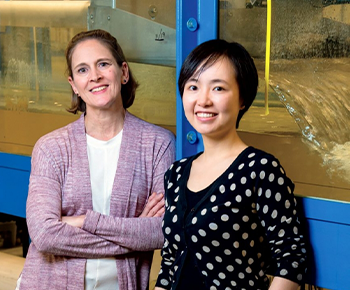
As a graduate student at MIT CEE, you will participate in research with renowned faculty and get a hands-on experience solving the world’s largest problems.
Learn more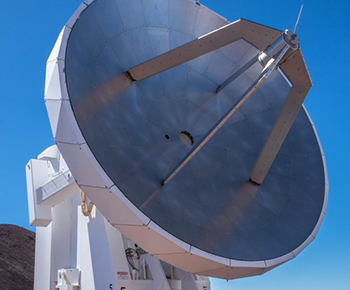
Review our application timeline and find answers to our most frequently asked questions for the graduate degree programs.
Learn more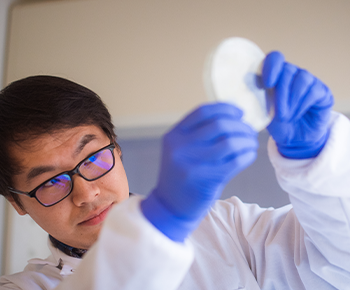
All students admitted to the SM/PhD track receive Research Assistantships (RA) or Fellowships, depending on availability of such funds.
Learn more
Course 1 has given me the unique opportunity to take on environmental issues in the developing world while simultaneously being a part of cutting-edge research at MIT. In addition to developing a close relationship with my professors, Course 1 stimulates me to think outside the box and to apply myself to real world problems. ”
Our faculty make every effort to get to know students as people and learn about what makes them tick. The professors know you by name, and ask how your weekend or break was when they pass you in the hallway, even years after taking their class. Our classes encourage us to work in teams and groups, some of which have fostered my best friendships at MIT. We’re a friendly, happy major that supports each other both in and out of the classroom ”
My favorite thing about being a MIT CEE grad student is being able to collaborate, network, and develop friendships with some of the smartest, driven, talented, and creative individuals. It really is a special feeling to be surrounded by people all with different groundbreaking ideas, passions, or goals. ”
I wanted to find solutions for the future, ensuring that the infrastructure we build today is sustainable and long lasting. This program offered the perfect combination to improve my technical skills and focus on sustainability. ”
It feels like someone in CEE touches every corner of climate change, from atmospheric chemistry to transportation systems and everything in between. It’s why we started the graduate student seminar series, and I’m always excited to hear what my neighbors in the office are working on. ”